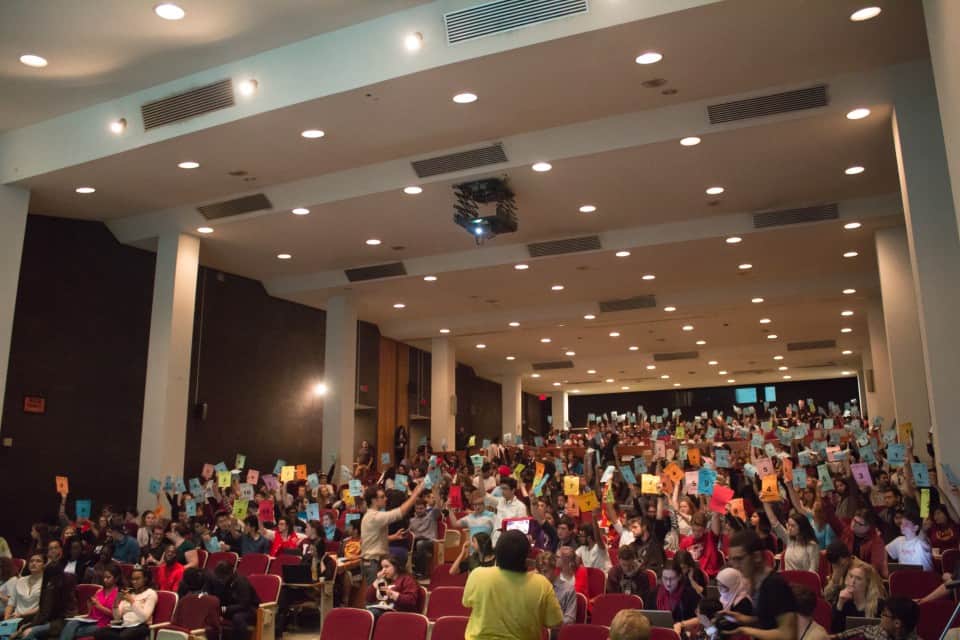This article has been updated from a previous version.
A lengthy Annual General Meeting (AGM) of the University of Toronto Students’ Union (UTSU) has failed to produce a necessary board structure moving forward in order to comply with federal law. Narrow defeat was ultimately snatched from the jaws of victory after one of two competing proposals was elected for confirmation, before failing to meet a required two-thirds majority vote by the union’s membership.
A full house of students attended the meeting, which was held at the Ontario Institute for Studies in Education (OISE) on the St. George campus.
Before the high profile vote on board proposals could take place, there were several amendments made to the meeting’s agenda, discussion of which took up nearly two hours of the meeting time. The amendments led to two new items being added to the agenda, the withdrawal of a motion to implement computerized voting, and moving the proposal ratification vote to immediately after the election of the proposal.
Vote on board proposals
Going into the AGM, the UTSU’s current board of directors’ structure exists outside of the provisions of the recently updated Canada Not-for-profit Corporations Act (CNCA) – the piece of federal legislation that governs organizations like the UTSU. Continued failure to ratify a new, compliant, structure would invariably result in the dissolution of the union. Two competing proposals were up for debate at the October 6 meeting.
Appendix A, as it was referred to in the meeting’s agenda, was moved by Arts & Science at-large director Khrystyna Zhuk and seconded by University College director Daman Singh. The other proposal up for ratification, referred to as Appendix B, was moved by former UTSU vice-president external and orientation coordinator for this year Grayce Slobodian.
With 607 votes in favour of Appendix A, and 529 for Appendix B, the gathered membership elected to consider the board-endorsed Zhuk/Singh proposal to be considered for ratification. However, following the inclusion of several friendly amendments, the proposal failed to meet the two-thirds majority vote required and therefore did not pass; with 562 votes in favour of ratification and 455 votes against.
The UTSU’s legal counsel was present throughout the meeting and clarified that, despite the fact that neither proposed structure ultimately passed, the union would not dissolve immediately. “The union won’t dissolve in this instance where something is not passed,” said Andrew Monkhouse of Monkhouse Law. He encouraged the room to come to a consensus and to pass by-laws that are compliance with the CNCA.
“There’s a lot of emotions right now,” said Zhuk after the meeting. “We’re happy we won the [board structure proposal] election, but frustrated we didn’t win the two-thirds vote. We’re tired and it’s been a really long process so it’s unfortunate we didn’t get the outcome that we wanted,” she added.
“If you looked around the room, three quarters [of students] were in favor of the proposal. In terms of the proposal itself, we have consulted with so many student groups. I cannot put that on my team because they literally put their blood, sweat, and tears into this proposal.” Zhuk continued.
She also stated that she will put the proposal to the Special General Meeting (SGM) to take place in a few weeks time and hinted that it may be amended further before then.
Ryan Gomes, UTSU vice-president internal & services, said that he felt overwhelmed at the close of the meeting. “I don’t want to say I’m disappointed because I think over everything we have to respect our members when they speak. But I am disappointed because at the last AGM there wasn’t a lot of consultation,” he said, adding that Zhuk and Singh consulted with the University of Toronto Mississauga Students’ Union (UTMSU) to ask what they could do to make sure the proposal would be accepted by UTM in the future.
“All I can say is I feel very demoralized because I thought that we had come to a solution I thought was good for everyone and it turns out that I was wrong.”
Gomes stated that, moving forward, he plans to take more of a hands-on approach. “There needs to be a lot of reconciliation between all the different groups on campus. A lot of different groups feel like they don’t want to talk to each other because they’re so ideologically apart. As a UTSU exec[utive] I need to place myself in a situation to bridge that gap because if we don’t bridge that gap, I am genuinely fearful for the long-term viability of this organization. If we’re not in compliance with the CNCA, we are going to be in trouble.”
The meeting adjourned shortly before 11:00 pm, before the remaining items on the agenda could be considered. These items include the receipt of the union’s audited financial statements, other by-law amendments, and member-submitted motions, two of which were submitted from the floor during the meeting.
This is not the first time that a meeting has adjourned prematurely; last year’s AGM ended in a similar fashion.
The remaining motions unattended to at the AGM will carry over to the UTSU SGM, scheduled to take place later this year.


